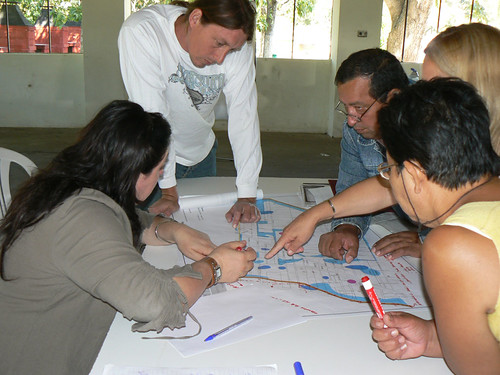THEMATIC SESSION TECHNICAL COOPERATION FOR DISASTER RISK REDUCTION
 Photo: Margarita Villalobos / UNISDR |
1. BACKGROUNDDisaster risks related to hazards such as tropical cyclones, flooding, earthquakes, droughts and tsunamis; as well as risks related to technological hazards 1, constitute an important challenge for development. During 2011 only, 302 disasters took 29.782 lives, affected 206 million people and caused damages estimated in 366.000 million dollars. |
_______________________________________________________________________________________________
Whereas developing countries and the most vulnerable people are under a great risk, losses such as the eastern Japan large-scale earthquake and tsunami, show an increase in global social and economic losses due to the increasing magnitude and frequency of disasters. Therefore, the disaster risk reduction (DRR) constitutes one of the major challenges for the region´s sustainable development, and in this context, the reduction of vulnerability and exposure to risk, as well as the increase of resilience, require an integral approach (public and private) for the incorporation of strengthening mechanisms such as public and private investment planning systems on infrastructure and social protection. The Hyogo Framework for Action 2005-2015 (HFA), the international agreement that guide the governments, communities and private sector to promote a culture of prevention and disaster management in order to minimize the loss of human lives and economic damages due to natural hazards and increase resilience at regional, national and local level; establishes five priorities for action that draw practical directions for all the key actors involved in disaster risk reduction.
2. TECHNICAL COOPERATION FOR DISASTER RISK REDUCTION
Recent reports about technical cooperation in the region clearly reflect that there is a tendency towards the strengthening of horizontal and triangular cooperation mechanisms as opposed to the traditional concept of technical assistance. In this context, cooperation is seen as a mechanism for the strengthening of capabilities, as well as an instance for collaboration and articulation that favors and supports the regional integration processes . The systematic registering of information about the South-South cooperation and the technical assistance programs constitutes a process recently initiated in the region. The efforts by the Ibero-American General Secretariat SEGIB have made an important contribution to this process. For the Latino-American case, according to SEGIB, only five years ago just a few countries had access to this information. The systematization of cooperation experiences has provided a clearer picture of the thematic areas that define the demand and offer regarding cooperation in the regional context (as well as who are the providers and who the receptors). Likewise, it has allowed the gathering of information about the new concept frameworks upon which the cooperation in the region is structured, particularly the "South-South" and "Triangular" cooperation schemes. Available information on cooperation in the disaster risk reduction area indicates that most of the countries' efforts are focused on humanitarian aid in emergency cases. In general terms, there is a very positive picture regarding the cooperation projects dynamic and the capacity to implement response operations. However, without the systematization of cooperation mechanisms, that accompany development processes, and which have a direct impact on the implementation of the disaster risk management, this picture would be incomplete. In other words, it is necessary to count with information about how the technical cooperation (South-South and Triangular) integrates and/or impacts the disaster risk management in the context of the sustainable development and beyond cooperation in post-disaster situations.
3. Session Objectives
● To identify lessons learned and challenges to the development and consolidation of regional cooperation mechanisms (horizontal/South-South, Triangular) for disaster risk reduction.
● To establish general guidelines for the strengthening of technical cooperation mechanisms on DRR and CCA in the Americas, within the sustainable development context (South-South and Triangular cooperation)
4. Session scheme and issues to be addressed
The activities of this thematic area will be organized in three sessions: progresses and challenges (reflection about the current situation); vision towards the future (guidelines for strengthening and consolidation of actions in the thematic area); examples of significant experiences (tackling specific technical aspects). The suggested topics for each session are: First session (Panel): progresses and challenges a. Evolution of conceptual and methodological bases: emergency assistance vs. cooperation for development; horizontal and triangular cooperation vs. technical assistance. b. Systematization of cooperation demand and offer: c. Lessons learned, challenges towards the future: starting with the systematization of experiences Second session (panel): guidelines for the strengthening of technical cooperation mechanisms on DRR and CCA in the Americas, within the sustainable development context a. Institutionalization of technical cooperation mechanisms b. Systematic registration of technical cooperation information c. Capacity development d. Accountability (Providing visibility to technical cooperation) Third session (panel): significant experiences on the technical cooperation area a. Strengthening of capabilities: DRR and CCA within the context of sustainable development (Regional, national and local) b. Prevention, relief and recovery c. Early warning systems within the national and cross-bo